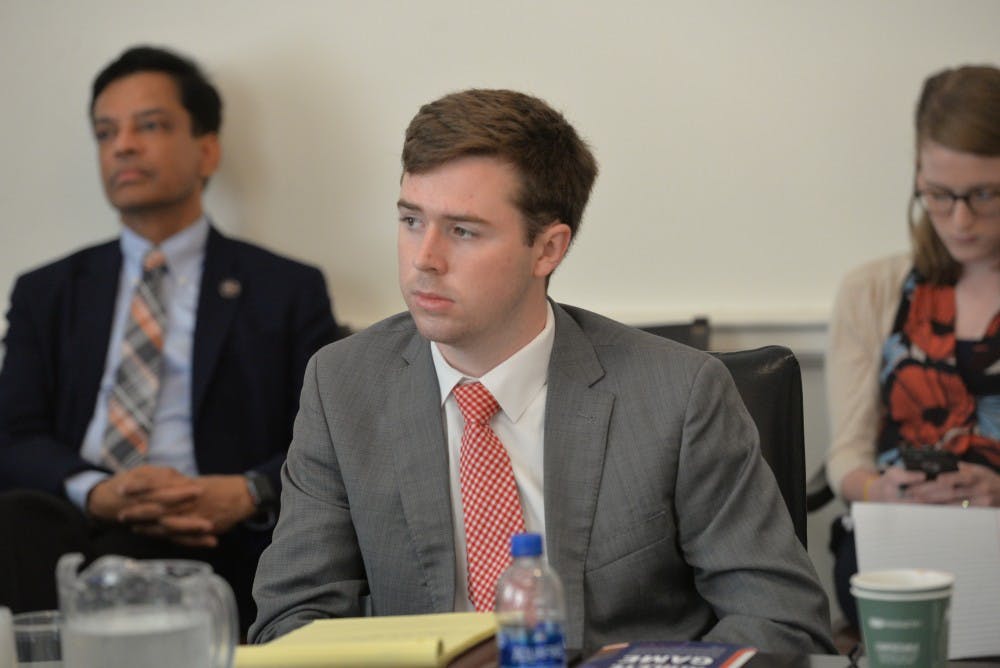The University’s Board of Visitors discussed several key items at their full meeting of the Board Dec. 7, including recent funding for new developments granted to the University Health System and changes in enrollment and organization at the University’s College at Wise. The session also featured commentary from BOV student member and fourth-year College student Brendan Nigro.
Nigro began his remarks with reference to recent proposals put forward to the University administration by the Latinx Student Alliance and Asian Leaders Council, which aim to increase diversity and acceptance of students from all ethnic backgrounds at the University. Copies of the proposals were distributed by means of a handout to members in attendance.
“They bring these great proposals about how we can make our University a more inclusive space for students from underrepresented backgrounds,” Nigro said . “So I think it’s just an incredible culmination of student leadership and research that they want to see this place improve, and … I do just want to commend the president, Provost’s Office senior leadership, have been really proactive in getting to meet with these students and trying to make strides for the University.”
The bulk of Nigro’s presentation involved allocating more of the University’s resources to better serving the graduate student community, including continued concerns over affordable housing and parking on or close to Grounds.
While high housing prices in and around the Charlottesville area affect students, faculty and community members in similar ways, Nigro explained the cost is often greater for graduate students, who receive only a limited stipend for living expenses during their time at the University.
“A lot of our graduate students, in an oversaturated housing market in Charlottesville, don’t feel like they have the active funds to live in this city and live with the sort of graduate subsidy they get, especially from GSAS, the College,” Nigro said. “They don’t feel like what could be a one bed, one bath rent for the year — about $9,500 — doesn’t really match with their $24,000 subsidy. And so … I would love to see from the University an effort to make housing more affordable closer to campus.”
Nigro also addressed parking scarcities for students who commute to Grounds — an especially pressing issue for graduate students, who often live further away due to lower housing costs. While the University has taken some efforts to address this — including scrapping a plan that would have charged a fee for late night parking at the Central Grounds Garage — Nigro argued more could be done, especially in terms of graduate students who have frequently expressed frustration with the problem. Nigro played an instrumental in the University’s decision to back away from imposing the new parking fees, as did significant backlash from students to the proposal. Nigro announced that the planned policy had been discontinued at a Student Council meeting Dec. 4.
“I think this is a really important moment for the Board to consider those concerns from graduate students, especially as we think about the Emmet-Ivy Corridor, and our options there to better serve students, and sort of alleviate some of these stresses on the students and researchers that are really important to faculty discovery and the University’s research portfolio overall,” Nigro said.
Nigro also spoke to issues faced by graduate students with families, who make up a significant though small amount of the overall post-undergraduate student population. A chief concern for these families healthcare, which due to the additional cost of housing, is often out of reach for graduate student parents on limited budgets.
“While it’s certainly not feasible to have a department of pediatrics in our Student Health building, especially for our international student parents, [healthcare for dependents] becomes a really pressing issue,” Nigro said. “I know we’re already strapped at Student Health, but as that system expands, I think there’s an opportunity to think more broadly about support for students’ families on Grounds
In closing, Nigro also made mention of an additional lack of family-oriented housing on-Grounds as a compounding factor in the ongoing housing shortage.
“There’s very little housing on Grounds that’s family-oriented. Even the spaces that are family-oriented actually aren’t given preference to students with families, and so finding a way to help our graduate students with families to find University housing that’s amicable to their interests,” Nigro said. “All this is to say that I think we have a tremendous opportunity to serve our graduate and professional students better at the University.”







